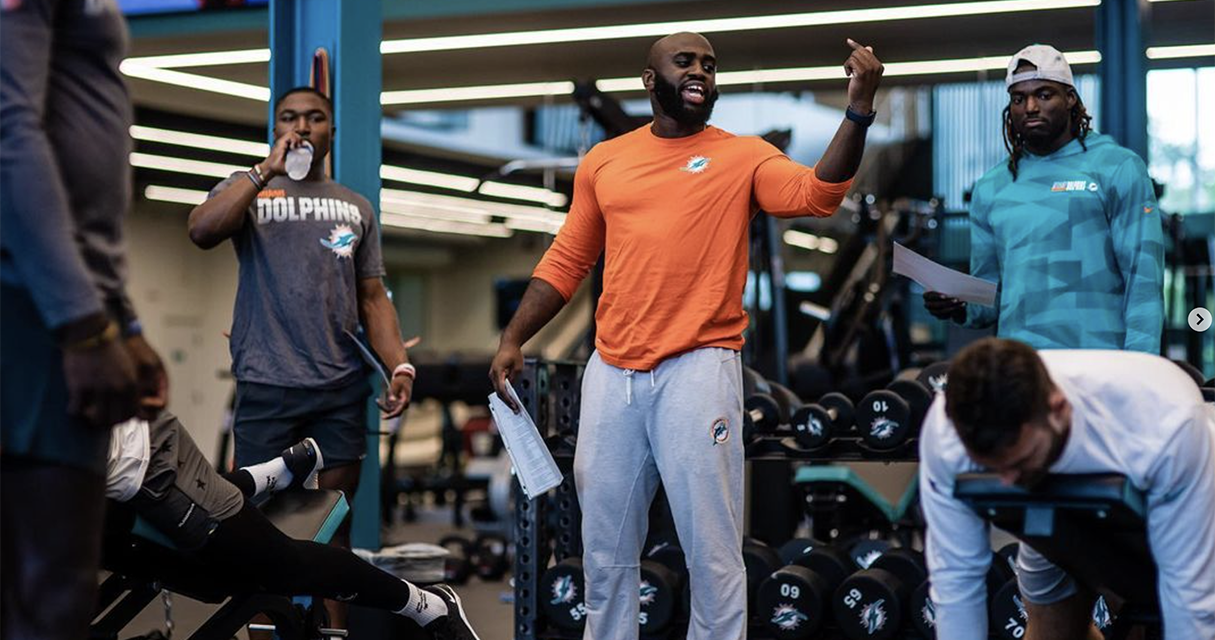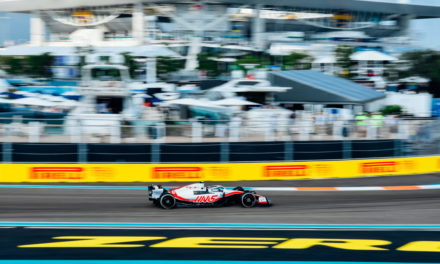Winning football has evolved well beyond player skill, execution and play calling. Today, all 32 NFL teams have a Sports Scientist on staff. Joshua Woods performs that role on the Dolphins, and MiamiMan caught up with him to learn why it matters.
Football is a simple game.
One team tries to move a football into the other team’s end zone, and the other team tries to stop them. Explain it that way to someone who has never witnessed a game, and chances are they’ll imagine it being exactly like what we see on the field.
But as anyone involved with a professional sports team understands, the level of detail, teamwork, and excellence required to win an NFL game, much less a Super Bowl, is staggering. When sports media personalities talk about football being the most team-oriented sport, even they probably don’t know the half of it.
Joshua Woods is one small cog in the machine that is the Miami Dolphins. But he’s as important a cog as any. His official job title is the Coordinator of Sports Science and Assistant Strength and Conditioning Coach. That’s a mouthful, but he basically describes himself as a point guard.
Woods collects and analyzes intricate data about players’ speeds, intensity and the volume of their output. He then passes the relevant bits of that information to people who need to know.
“My job is to take all this complex data and make it very simple for our football coaches, so we can make better decisions and better observations of where a player is at.
“Not only with speed…we’re measuring how high they jump, how much force they develop while jumping, their breaking phase, how they stop their jump. We analyze that across the season.
“Let’s say we’re doing a squat. We’re looking at the speed, in meters per second, to see how fast that bar moves. There’s research out there that says if the bar moves at this speed, that these are the adaptations that the guys are going to have.”
Woods stresses that player patterns in practice and changes to them have a major impact. He likens it to how an automobile works.
“You drive the same miles per hour to work every day. One day you decide to take a different route, and you drive faster. Then you do that again, and again. Eventually, your car’s gonna be like, ‘What’s going on?” What’s this change?’ We really look if there’s anything over 60-70% change in a guy’s output.
“The hardest thing a human body can do, and produce the most force doing it, is sprint. Taking off running full speed is the hardest thing your body can do. I count the number of times that guys do that. So if a guy does that five times in a practice and that’s pretty consistent, his average is five sprints. Then he does 15 one day and 15 the next day. We need to monitor that guy to make sure he doesn’t blow a radiator.
“I have the conversation with an athlete. ‘Hey, you did way more than you normally do.’ ‘Yeah, coach, I know, I’m tired today.’ ‘Okay, well make sure you get a massage this week. Make sure you increase your carbs this week.’
“I might pass them to the trainer, ‘Hey, this guy hasn’t hit 20 MPH in two months.’
When that guy gets in the game and hits 20, we don’t want that to be his first time exposed to that in two months. So we will run extra sprints with certain guys after practice if they haven’t achieved a sprint over 90% of their match speed. I’m able to get that information from the tracking.
“It’s a long grind of a season. It’s a lot on these guy’s bodies. We try to tell these guys to relax as soon as the season’s over. They need to get their bodies a break.”
In theory, it would seem that a sports scientist would have to sell the benefits of crunching numbers and using data to athletes. They play in a game so fast-paced that players don’t have a second to question their output.
Woods says that’s not a problem in Miami. He’s unequivocal that all the Dolphins’ players are on board with anything that makes them better.
It doesn’t hurt that Woods was a former player himself, at the University of South Carolina. He understands that nothing motivates athletes like competition, even among teammates.
“I post their speeds, top speeds of the day. These guys are competitors. They want to compete in anything. You put a number up, they want to be the best. I drive competition through statistics, I would say.”
As Woods points out, sometimes his involvement with players can lead to underlying issues that a team has to address. In the NFL, players unquestionably need to be in the game mentally, and sometimes analyzing player performance will uncover a different problem.
“Stress is not only just, ‘We have a big game tonight’,” he says. “Stress with some of these guys is, ‘I just had a baby. I’ve got to leave my wife and go play a game with a newborn.’ So that’s stressful.
“And that’s a conversation. The data gives you conversation starters. ‘Okay, I see you’re not running fast today. You’re not moving the bar fast. Your jumps are down. What’s going on? You all right?’ ‘Well, actually, man, I’m having some problems at home.’
“Now we’ve got some other decisions to make. We have a player development person that could help guys in their personal life. We have a clinician, a psychologist, we have a huge emphasis on players and their safety and wellness and well-being.
“We all work together in the athletic training…sports science, the headstrong coach, the nutritionist, the sports psychologist, the team chaplain, the player development. It’s all a team.
“I kind of just assist with the team. Make sure everybody gets a hand on the guy.”
Given that the Dolphins have strung together four straight winning seasons for the first time since 2003…it seems like the knowledge sharing isn’t hurting.
“I guess the improvement just comes with guy’s confidence,” Woods says. “Sometimes what these numbers do is give guys a little bit more confidence in themselves. You’re coming back off of an injury, you wanna make sure you still got it. This data can provide some of that.”
As football knowledge, technology, and awareness grows so does the need for more individuals to pull together to make a team victorious on the field. Woods understands that ultimately, it’s still the Ws that matter most. He cites the heavy turnover in coaching at every level in the NFL, including his. Woods loves his job, but there’s no question the competition is demanding.
“This is the highest level of performance, in my opinion, one of the hardest physical sports in the world. It requires tons of energy, speed, endurance, all the strength. Every component of human sports life is entailed into our athletes in American football.
“I gotta keep getting better and seeing what’s new, what people are doing. It’s a lot of research on things and making sure that research is applicable in our setting.”
But he also believes the growth and increasing level of competition is a good thing. After all, it’s employing people…in a field they might dream about being a part of.
“I didn’t grow up wanting to be a sports scientist,” he reflects. “I didn’t say ‘That’s what I’m gonna do with my career’. But when something’s going well and you’re good at it, sometimes it’s your calling. It’s what I keep getting hired to do. So, I just try to keep doing a good job.”
Woods also thinks it’s an important message for young people.
“I think one of the best majors you could be is a STEM major. I’m a huge advocate of that, this is a pretty cool lane to science, technology, engineering, and math. This is great for that kid that, you like science, you like football, there’s a job for you in football.
“I’m trying to start an organization called More Than One Way, especially for kids where I’m from in South Carolina. I’m from pretty much nothing but football. That’s all we do. Just letting people know that there are multiple ways to make it to the NFL.
“We have writers, we have a data analyst, we have sports scientists, we have a nutritionist, we have doctors, we have a clinician, we have surgeons. It’s so many departments that we have, and we all have to work together to help these guys.”
Thankfully for Dolphins fans, those hundreds of folks from every angle seem to be putting our team on a winning path again. Woods sees a bright future for the Dolphins.
“I think Coach McDaniel’s a great coach. The guys love him. We have a great team. He believes in the science, and he does a great job of explaining it to our guys and showing them why we do what we do, and what’s gonna make us better and better each year.”
So if your son or daughter is good at science, have them follow the Dolphins on LinkedIn. Maybe they could be a part of that long-overdue championship in Miami.

Josh Woods, Miami Dolphins Sports Science Coordinator / Strength & Conditioning Assistant









